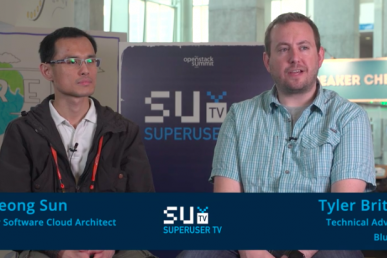The OpenStack User Committee helps increase operator involvement, collects feedback from the community, works with user groups around the globe and parses through user survey data, to name a few.
Here Superuser talks to one of the new members of the Committee, Yih Leong Sun, about multi-cloud, upcoming challenges for users and how you can get involved. He’s been at Intel since 2015 and holds a PhD in multi-cloud orchestration.
You can catch him speaking at the Vancouver Summit with Henrik Blixt of VMware on “Lesson learned and best practices for large-scale enterprise private cloud” and connect with the User Committee at these events.
You’ve been involved with OpenStack since 2012,what is the biggest evolution you’ve seen?
OpenStack has been evolving as a de facto standard for open source cloud infrastructure platform. It started with a handful of services (also known as projects) and today counts more than 60 services [I may have lost count.. :-)].
The user base is also growing exponentially across industry in various countries and regions supporting different kinds of production workloads. Many organizations have already started to realize the benefits of using open-source architecture as part of the cloud strategy and OpenStack is definitely among the top choices!
What are some of the most pressing issues facing OpenStack users now? In the next year?
With the explosion of next-generation workloads (IoT, edge, AI, machine learning, NFV, etc.), the needs of dynamic composable and scalable infrastructure will bring new challenges to OpenStack architecture. Bridging the user gaps is always a challenge.
The User Committee and Technical Committee are collaborating closely to streamline the process of getting new user requirements into the project development pipeline.
We encourage users across the globe to actively participate in the various UC Teams and Working Groups, or the Special Interest Groups and help to enable OpenStack for various workload applications.
Multi-cloud is one of the most popular terms people search for on Superuser, what considerations should people make when they’re just getting started?
My PhD research is in the area of multi-cloud orchestration. There are many aspects that a user needs to be aware of when considering a multi-cloud solution: API, resource orchestration (compute, storage, network), security, authentication, federation, metadata, etc.
From a cloud operator’s perspective, a cloud management platform that provides a provider-agnostic model of operating multiple cloud providers can be useful. From a cloud app developer’s perspective, how to develop an application that can run across multiple cloud environments (e.g. through Kubernetes/container or other platform-as-a-service platform) could also of different interest.
Anything else you’d like to add?
I’m excited to be elected as one of the core members of User Committee. Special thanks to all of the community members who have supported me. With the variety of backgrounds and experience in 2018 User Committee members, I’m confident that the team will bring effective contribution and benefits to the OpenStack community, especially the users!
Get involved
The User Committee coordinates via the user-commitee mailing list and you’re invited to post your ideas as well as via IRC on freenode in #openstack-uc channel. Consider joining the working groups and teams under UC governance found here.
They hold weekly IRC meetings on Monday at 1800 UTC in #openstack-meeting
Superuser wants to hear what you’re doing with open infrastructure, get in touch: editorATopenstack.org
- Demystifying Confidential Containers with a Live Kata Containers Demo - July 13, 2023
- OpenInfra Summit Vancouver Recap: 50 things You Need to Know - June 16, 2023
- Congratulations to the 2023 Superuser Awards Winner: Bloomberg - June 13, 2023

)










